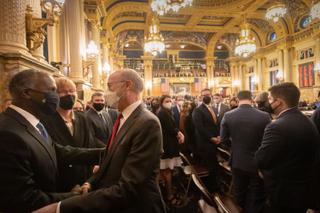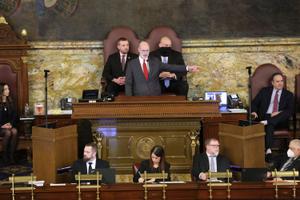Spotlight PA is an independent, nonpartisan newsroom powered by The Philadelphia Inquirer in partnership with PennLive/The Patriot-News, TribLIVE/Pittsburgh Tribune-Review, and WITF Public Media. Sign up for our free newsletters.
HARRISBURG — In his eighth and final budget address, Democratic Gov. Tom Wolf returned to the themes that have marked his two terms in office, advocating for a nearly $2 billion boost for public schools and higher education, a hike in the minimum wage, and new investments in infrastructure and public health.
During a 20-minute Tuesday speech laced with references to his administration’s legacy, the term-limited governor said that after struggling with deficits for years, Pennsylvania is flush with extra money —the result of good budgeting practices and favorable revenue collections, he said.
“These are days of opportunity for our commonwealth,” Wolf told a joint session of the legislature. “That’s because, at long last, our fiscal house is in order. … We are no longer digging out of a hole.”
Though Wolf’s nearly $44 billion financial blueprint does not include any proposed increases to Pennsylvania’s two largest money sources — the state income and state sales tax — it is almost certain to face pushback from GOP leaders.
Their criticism stems from the plan’s reliance on spending the billions in remaining federal aid to help Pennsylvanians recover from the financial blows delivered by the ongoing pandemic.
Legislative Republicans in recent weeks have argued that Wolf’s call to spend these dollars in one fell swoop will push the state off a financial cliff in the coming years, leaving Pennsylvania in the precarious position of either having to turn to deep cuts in spending or painful increases in taxes.
In all, Wolf’s budget proposes to spend 13% over this fiscal year’s $38.6 billion plan. That includes a $1.25 billion increase for K-12 education that would be entirely funneled through a formula meant to ensure that underserved school districts receive adequate funding.
The administration says it can support the spending increases in part because Pennsylvania raked in more money than expected this year in tax collections, leading to a $1.8 billion surplus through January.
The state, administration officials said, also has access to roughly $2.2 billion in federal pandemic aid from the American Rescue Plan Act and will save another $1.1 billion this fiscal year as the federal government continues to pay a higher portion of its medical assistance contribution through June 30.
The $2.6 billion in state taxpayer dollars that Wolf and the legislature put into the budget reserve last year, nicknamed the rainy day fund, would remain untouched.
Republicans countered that the state’s flush coffers are only temporary. A recent budget report by the nonpartisan Independent Fiscal Office projected a “substantial surplus” in this fiscal year’s budget, “but operating deficits for future years.” By the fiscal year that begins in July 2023, Pennsylvania could be staring at a nearly $2 billion deficit, according to the IFO’s report.
“While this year’s revenues continue to outpace estimates, the long-term financial picture for the commonwealth remains uncertain,” said state Sen. Pat Browne (R., Lehigh), who chairs the chamber’s powerful Appropriations Committee. “The governor’s revenue and spending projections over the next several years are unrealistic, do not align with traditional rates of growth, and will make worse our existing structural imbalance.”
That fundamental disagreement over spending is bound to color the tenor of negotiations in the coming months between Wolf and legislative leaders. And it will play out against the backdrop of a key election year — which includes the race to succeed Wolf — primed to be marked by partisan divisions over policy and finances.
Still, Wolf has stepped away from the bold but highly controversial budget proposals that marked his first two years in office and led to stubborn impasses. In turn, legislative Republicans have approved portions of the governor’s spending asks, primarily for public schools and early childhood and special education.
Here are some topline takeaways from the spending plan:

Education
In his proposed budget for the 2022-23 fiscal year, Wolf requests $1.25 billion more in funding for K–12 education, as well as an additional $200 million for special education and $70 million for early childhood education.
The governor also resurrects a previously unsuccessful push to raise the minimum salary for teachers to $45,000 a year, a policy change that has faced an uphill battle in the legislature.
Wolf wants an additional $75 million for the State System of Higher Education’s 14 state-owned colleges and universities, and another $200 million to underwrite a new scholarship program to provide aid to those schools’ students. That initiative, called the Nellie Bly Scholarship program, is open to students who pledge to remain in Pennsylvania after graduation for the same number of years they received scholarship funds.
Wolf would pay for the scholarship program in part through dollars that now help subsidize the state’s horse racing industry, a proposal advocates say would decimate the sport.
Wolf’s budget also pledges an additional $28.5 million for the so-called state-related universities: Penn State, Lincoln, Temple, and Pitt.
Minimum wage
As he has every year since taking office, Wolf urged lawmakers to raise the state’s minimum wage, even though many Republicans have balked at the change in the past. Pennsylvania is among a minority of states that still use the federal minimum of $7.25 an hour.
“We’re literally surrounded by states that are getting minimum wage workers a better deal,” Wolf said Tuesday. “This is embarrassing.”
Under his proposal, the minimum wage would go to $12 an hour starting July 1. After that, there would be annual increases of $0.50 until the minimum wage reaches $15 in mid-2028.
As in years past, GOP lawmakers are likely to reject the proposal.
Policing
The budget adds $141 million to the State Police budget, money meant to reduce transfers from a fund dedicated to fixing bridges and highways. The practice recently drew national attention and renewed scrutiny after a bridge in Pittsburgh collapsed, sending four drivers to the hospital.
In 2016, the legislature capped how much money could be transferred from the fund to prop up the State Police budget, with a goal of reducing it to $500 million by the 2027-28 fiscal year. Wolf’s proposed 2022-23 budget reaches that target by supplying general fund dollars to the department.
The money will fund cadet training programs and help troopers work through the background check backlog, while freeing up the bridge and highway funds. That money in turn will be used as a state match to federal dollars aimed at rehabbing Pennsylvania’s aging infrastructure, state officials said.
The budget also calls for $7.7 million for body cameras and another $7 million in increased funding to the Department of Human Services to supply beds for people leaving prison with medical and behavioral health needs.
Health
Wolf’s budget invests an additional $91.25 million in medical assistance payments to skilled nursing facilities, which have said care needs have far outpaced the state reimbursement, and an additional $14 million to state-run veterans homes.
In response to the speech, industry representatives called on the state to put more funding toward the reimbursement rate.
“The governor’s proposed Medicaid funding increase would be a critical step toward sustainability for long-term care — but it’s simply not enough,” said Pennsylvania Health Care Association President Zach Shamberg, whose organization has asked for a $249 million investment in Medicaid funding.
WHILE YOU’RE HERE… If you learned something from this story, pay it forward and become a member of Spotlight PA so someone else can in the future at spotlightpa.org/donate. Spotlight PA is funded by foundations and readers like you who are committed to accountability journalism that gets results.
